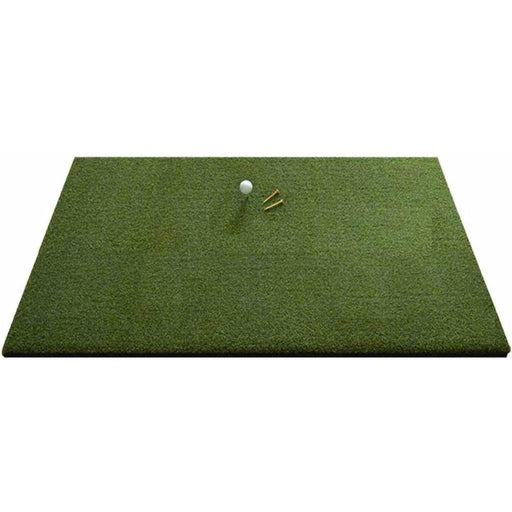
How Golf Simulators are Ideal for Beginners: A Comprehensive Guide
Golf can be an intimidating sport for beginners. The complexity of the game, the steep learning curve, and the need for access to a golf course or driving range can deter many would-be golfers from pursuing their interest. However, golf simulators have emerged as a powerful tool to bridge this gap, making the game more accessible and enjoyable for beginners. In this comprehensive guide, we will explore how golf simulators can benefit beginners, helping them to learn the game, practice effectively, and ultimately become better golfers.
Introduction to Golf Simulators
Golf simulators are advanced systems that replicate the experience of playing golf in a virtual environment. They use sensors, cameras, and sophisticated software to track your swing and simulate the ball's flight, providing a realistic and immersive golfing experience. Golf simulators typically consist of a launch monitor, an impact screen, a projector, and simulation software that includes virtual courses and practice ranges.
Why Golf Simulators are Perfect for Beginners
- Convenience and Accessibility
For many beginners, the logistics of getting to a golf course or driving range can be a significant barrier. Golf simulators offer the convenience of practicing at home or in a dedicated indoor space, eliminating the need for travel. This accessibility allows beginners to practice more frequently and consistently, which is crucial for skill development.
- Year-Round Practice
Weather conditions can often limit the ability to practice golf outdoors. Rain, snow, or extreme temperatures can make it challenging to maintain a regular practice schedule. Golf simulators provide a climate-controlled environment where beginners can practice year-round, ensuring that they can continue to improve their skills regardless of the weather.
- Instant Feedback and Data Analysis
One of the most significant advantages of golf simulators is the immediate feedback they provide. Beginners can see detailed data on their swing, including club speed, ball speed, launch angle, spin rate, and shot trajectory. This information is invaluable for understanding what you are doing right and where you need to improve. By analyzing this data, beginners can make adjustments to their technique and see the impact in real-time.
- Learning the Basics
Golf simulators are an excellent tool for learning the fundamentals of the game. They offer various practice modes and tutorials designed to teach beginners the basics, such as grip, stance, and swing mechanics. Many simulators also provide instructional videos and tips from professional golfers, helping beginners build a solid foundation.
- Reduced Pressure and Comfort
For beginners, the golf course can be an intimidating place. The fear of making mistakes in front of more experienced golfers can create unnecessary pressure and hinder learning. Golf simulators offer a private and comfortable environment where beginners can practice without judgment. This reduced pressure allows beginners to focus on learning and improving at their own pace.
Choosing the Right Golf Simulator for Beginners
When selecting a golf simulator, it's essential to consider factors that will best suit a beginner's needs. Here are some key aspects to keep in mind:
- Budget
Golf simulators come in a wide range of prices, from affordable options to high-end systems. For beginners, it's important to find a simulator that offers a good balance between cost and features. Entry-level models like the SC4 provide a reliable and enjoyable experience without a hefty price tag, making them ideal for those just starting.
- Accuracy and Technology
While beginners might not need the most advanced technology, it's still crucial to choose a simulator that provides accurate data. Look for simulators with reputable launch monitors that use radar or camera-based systems to track your swing. SkyTrak and ProTee VX are excellent options that offer reliable performance and accuracy.
- Software and Course Library
The quality of the simulation software and the variety of virtual courses available can greatly enhance the learning experience. Choose a simulator that offers intuitive and user-friendly software with a comprehensive course library. Software like E6 Connect and The Golf Club 2019 are known for their realistic graphics and diverse course selection.
- Space Requirements
Ensure you have enough space to set up your golf simulator comfortably. A typical setup requires a minimum of 10 feet in width, 10 feet in height, and 12 feet in depth. Consider additional space for swing freedom and equipment like screens and projectors. If space is a constraint, portable options like the SC4 are a great choice.
How to Maximize Your Practice with a Golf Simulator
To get the most out of your golf simulator, it's essential to approach your practice sessions with a clear plan and goals. Here are some tips to help you maximize your practice:
- Set Specific Goals
Before each practice session, define specific goals you want to achieve. Whether it's improving your driving distance, accuracy, or mastering a particular type of shot, having clear objectives will make your practice more focused and effective.
- Utilize Data Analysis
Regularly review the data provided by your simulator to track your progress. Look for patterns and trends in your performance, and use this information to identify areas for improvement. For example, if you notice that your launch angle is consistently too low, you can work on adjusting your swing mechanics to achieve a better trajectory.
- Practice Consistently
Consistency is key to improvement in golf. Schedule regular practice sessions to build muscle memory and reinforce good habits. Even short, frequent sessions can be highly beneficial, especially for beginners who are just starting to develop their skills.
- Mix Up Your Practice Routine
Avoid monotony by varying your practice routines. Use different game modes, play various virtual courses, and challenge yourself with skill-based mini-games to keep your practice engaging. For example, you can alternate between practicing your drives, working on your short game, and playing a round on a new course to maintain interest and motivation.
- Simulate Real-World Scenarios
One of the great advantages of golf simulators is the ability to recreate specific scenarios you might encounter on the course. Practice hitting out of the rough, bunker shots, or tricky lies to prepare yourself for real-world situations. This type of targeted practice can give you a tactical edge when you play on an actual course.
The Role of Golf Simulators in Building Confidence
Building confidence is a critical aspect of learning golf, and golf simulators can play a significant role in this process. Here’s how:
- Controlled Environment
Golf simulators provide a controlled environment where beginners can practice without the unpredictability of outdoor conditions. This stability helps beginners focus on their technique and gradually build confidence in their abilities.
- Progress Tracking
Seeing measurable progress over time can boost a beginner’s confidence. The detailed data provided by simulators allows golfers to track their improvement in various aspects of their game. Achieving milestones, such as increasing driving distance or improving accuracy, reinforces a sense of accomplishment and motivates further practice.
- Repetition and Muscle Memory
Repetition is essential for developing muscle memory, which is crucial for consistent performance in golf. Simulators enable beginners to practice the same shot repeatedly, helping to engrain the correct movements and build confidence in executing different types of shots.
- Realistic Course Play
Playing virtual rounds on realistic courses helps beginners familiarize themselves with different course layouts and conditions. This experience can reduce the intimidation factor when they transition to playing on an actual course, as they will have already encountered similar situations in the virtual environment.
Testimonials: Beginner Success Stories
Hearing about the success of other beginners can be inspiring and motivating. Here are a few testimonials from beginners who have benefited from using golf simulators:
Sarah, a beginner from California:
"I started using a golf simulator six months ago, and it's been incredible. The instant feedback and detailed data have helped me understand my swing better. I've gone from barely making contact with the ball to hitting consistent, straight shots. The convenience of practicing at home has made a huge difference in my progress."
Tom, a beginner from New York:
"As a complete novice, I was nervous about starting golf. The golf simulator allowed me to learn the basics in a comfortable environment. The tutorials and practice modes were invaluable. Now, I feel confident enough to play on a real course, and I owe that confidence to the time I spent on the simulator."
Emily, a beginner from Texas:
"The golf simulator was a game-changer for me. It made practicing fun and engaging, and the variety of virtual courses kept me motivated. Seeing my progress in the data and being able to practice specific scenarios helped me improve faster than I ever thought possible."
Overcoming Common Beginner Challenges with Golf Simulators
Beginners often face several challenges when learning golf, many of which can be effectively addressed with the help of a golf simulator:
- Improving Swing Mechanics
One of the most significant challenges for beginners is developing proper swing mechanics. Golf simulators provide instant feedback on swing path, clubface angle, and impact position, allowing beginners to make real-time adjustments and improve their swing technique.
- Understanding Ball Flight
Understanding how different factors influence ball flight is crucial for beginners. Simulators track ball speed, launch angle, and spin rate, providing valuable insights into why the ball behaves the way it does. This understanding helps beginners make more informed decisions about their swing and club selection.
- Consistency and Repetition
Consistency is a major hurdle for beginners. Golf simulators offer the opportunity for repetitive practice, helping beginners develop a consistent swing. The ability to practice the same shot multiple times in a controlled environment is invaluable for building muscle memory and achieving consistent results.
- Learning Course Management
Course management is a skill that takes time to develop. Simulators allow beginners to play virtual rounds on various courses, helping them understand different course layouts and strategies. This experience can translate to better decision-making and improved performance on real courses.
- Overcoming Performance Anxiety
Many beginners experience performance anxiety, especially when playing in front of others. Practicing on a simulator provides a private environment where beginners can focus on their game without the pressure of an audience. This reduced anxiety helps beginners build confidence and enjoy the learning process.
Tips for Getting Started with a Golf Simulator
If you’re a beginner considering a golf simulator, here are some tips to help you get started:
- Research and Choose the Right Simulator
Take the time to research different golf simulators and choose one that fits your needs and budget. Consider factors such as accuracy, software features, and space requirements. Entry-level models like the SC4 are excellent options for beginners looking for a cost-effective solution.
- Create a Comfortable Practice Space
Ensure you have a suitable space for your simulator setup. It should be large enough to accommodate your swing and the equipment. Create a comfortable and distraction-free environment where you can focus on your practice.
- Start with the Basics
If you’re new to golf, start by learning the basics of the game. Use the instructional features of the simulator to understand grip, stance, and swing mechanics. Focus on building a solid foundation before moving on to more advanced techniques.
- Use Tutorials and Practice Modes
Take advantage of the tutorials and practice modes available in the simulation software. These features are designed to help beginners improve specific aspects of their game. Follow the instructions and practice regularly to see progress.
- Track Your Progress
Regularly review the data provided by your simulator to track your progress. Set achievable goals and monitor your improvement over time. Celebrate milestones and use the data to identify areas for further practice.
- Stay Motivated and Have Fun
Golf is a challenging but rewarding sport. Stay motivated by setting realistic goals and enjoying the process of learning and improving. Use the variety of game modes and virtual courses to keep your practice sessions engaging and fun.
The Path to Becoming a Better Golfer
Golf simulators are a powerful tool for beginners, offering a convenient, accessible, and effective way to learn and practice the game. From providing instant feedback and detailed data analysis to offering a comfortable and private practice environment, simulators can significantly enhance the learning experience for new golfers. By choosing the right simulator, setting specific goals, and practicing consistently, beginners can build confidence, improve their skills, and ultimately become better golfers.
At Simply Golf Simulators, we are committed to helping beginners find the perfect simulator to suit their needs. Our team of experts is here to provide personalized guidance and support, ensuring you get the most out of your investment. Whether you have questions about specific models, need assistance with installation, or want tips on maximizing your practice sessions, we're just a call or email away. Contact us at 1-855-348-4173 or info@simplygolfsimulators.com for personalized support.
Investing in a golf simulator is an investment in your game. With the right setup and approach, you’ll have the tools you need to practice effectively, enjoy the sport year-round, and achieve your golfing goals. Happy practicing!

Have Questions About Golf Simulators?
Our expert team is here to help you find the perfect golf simulator for your needs.
Featured products
-
SkyTrak+
Original price $2,995.00 - Original price $3,145.00Original price$2,995.00 - $3,145.00$2,995.00 - $3,145.00Current price $2,995.00Introducing the SkyTrak+ Launch Monitor: Unmatched Accuracy and Advanced Features Experience a new level of precision and innovation with the SkyTr...
View full details -
ProTee Majestic Simulator Package
Original price $9,618.00 - Original price $13,848.00Original price$9,618.00 - $13,848.00$9,618.00 - $13,848.00Current price $9,618.00ProTee Majestic Golf Simulator Package: Elevate Your Indoor Golf Experience Transform your home or business into a golfer’s dream with the ProTee M...
View full details -
Eagle Golf Mat
Original price $370.00 - Original price $1,130.00Original price $370.00$370.00$370.00 - $1,130.00Current price $370.00Introducing the Eagle Golf Mat: The Ultimate Golf Experience Are you passionate about golf and demand nothing but the very best in your practice eq...
View full details -
Retractable HomeCourse® Golf ProScreen 180
Original price $2,299.00Original price $2,299.00 - Original price $2,299.00Original price $2,299.00Current price $1,999.00$1,999.00 - $1,999.00Current price $1,999.00HomeCourse® Golf ProScreen 180 HomeCourse® Golf ProScreen 180 is a retractable golf screen and enclosure. HomeCourse® Golf ProScreen 180's ballisti...
View full details -
The Augusta V2 4'x12' 2 Cups
Original price $399.00Original price $399.00 - Original price $399.00Original price $399.00Current price $329.00$329.00 - $329.00Current price $329.00The Augusta is one of Big Moss’ traditional models. It offers unmatched versatility for teaching and year round practice. Make a long-term investme...
View full details





